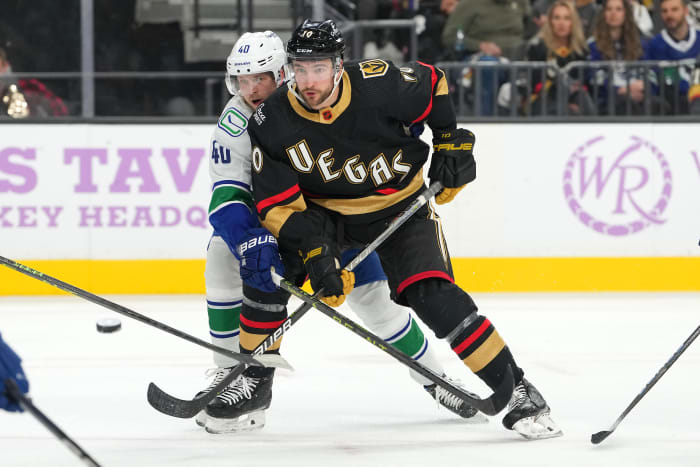This is Screen Shots, an ongoing THN.com feature in which we analyze a few hockey topics in smaller portions. That’s all that needs to be said, right? Right. Onward, we go.
First up: the issue of a play-in round for the Stanley Cup playoffs. In his media availability at the Board of Governors meeting this week, NHL commissioner Gary Bettman reiterated his position that he does not believe in the notion of expanding the post-season to include a play-in round.
There are good arguments to be made for that position – it devalues the regular season and risks injuries to players already taxed physically and mentally by the 82-game grind – but we think the expanded playoffs we’re now seeing in the MLB and the NBA also have their benefits.
If the NHL and NHL Players’ Association can come to some sort of compromise – perhaps, reducing the regular season to 75-77 games – it would make sense to have a play-in round, as it would keep more teams in the playoff hunt. for more of the regular-season.
Yes, that takes a little bit of the power out of the bulk of the regular season, but the NHL has, with its loser point standings system, already taken steps to ensure more teams stay in the playoff mix. This would be the next logical step in that process – and it would mean that the final 10 to 15 games would have a playoff-type atmosphere for those teams lower in their divisional standings.
In essence, most teams would be playing the same number of games, and the regular season would still dictate which teams would finish atop or near the top of their divisions, but you’d be replacing the ho-hum games for a few teams with games that people will be drawn to. Imagine continuing the tight battle in the Western Conference last season by having the Vegas Golden Knights and Vancouver Canucks play against the teams they tried to replace in the first round.
The NHL is still a gate-revenue-driven league, and the more teams that can generate sell-outs throughout the year, the better. You’ll get more teams that can do so with the expanded playoff races – and, of course, the play-in games themselves would be huge draws for the franchises involved.
It probably won’t happen – Bettman rarely discusses issues that he knows he doesn’t have the support of owners on – but there’s a reason why MLB and the NBA have chosen the route they’re on now. It helps them financially, and ultimately, expanded playoffs would help the NHL as well.
As the NHL’s March 3 deadline gets closer, we’re going to see more trades take place. A team like the Vancouver Canucks is one to watch for many reasons, one being team president Jim Rutherford’s well-established tendency over the years to make deals well in advance of the deadline.
We have a good idea of the teams that will be sellers – hello, Chicago, Arizona, Anaheim and Columbus! – but something to keep an eye on will be the number of teams that include first-round draft picks in trades. Franchises have been hesitant to include such valuable building blocks in trades, but there are a number of organizations that we suspect will be willing to part with a first-rounder, either next summer or in 2024.
Teams such as Toronto, Edmonton, New Jersey, the New York Islanders and New York Rangers, and Minnesota (and maybe more) may be ready to part with a first-rounder. And that’s because they’re tight against the salary cap, and thus, may want to figure out a way to fit a player like Hawks superstar Patrick Kane, or Vancouver’s Bo Horvat and Brock Boeser. Teams like the Leafs and Oilers would have difficulty making a deal of that size work under the cap, and with whispers that seller teams are loathe to retain salary, they may be persuaded to do so (or to take on some cumbersome contracts from the buyer teams) if they’re getting a first-rounder as part of the trade package.
This is the reality of a flat-cap NHL. Teams that aren’t going to be in the top 10 in this talent-rich draft year are going to see a first-rounder as the easiest asset to spend to get a rental of consequence. The Leafs, Wild, Devils, Islanders, Oilers and Rangers all are built to win now, and that’s the stage usually when we see GMs willing (or having little choice but) to sacrifice a part of their futures to beat out fellow buyer teams and Come away with veteran help.
Finally, here’s a heads-up to check out a couple of noteworthy hockey documentaries you can see right now: the first one is called “Offside: The Harold Ballard Story,” on the infamous former Toronto Maple Leafs owner, and the second documentary is the self-explanatory “Ice Breaker: The 1972 Summit Series.”
Both films are currently streaming at the Whistler Film Festival’s website through Jan. 2. After that, the Ballard documentary – which is directed by famous Canadian actor Jason Priestley – will air on the CBC Jan. 22.
But you’re well-advised to seek out both films. Their subject matter appeals to people who can vividly remember the reign of Ballard and the massive cultural impact of the Summit Series. And new generations of hockey fans can learn all about these two topics. The truth is always stranger than fiction, which makes the Ballard and Summit Series docs worth your time.
.
